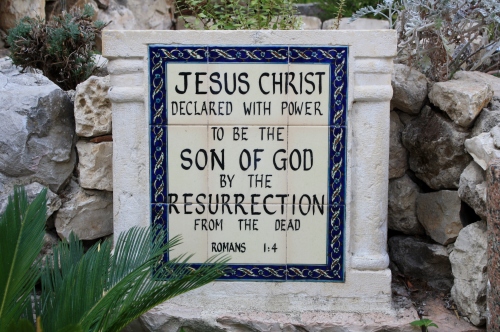
And the eyes of them both were opened, and they knew that they were naked; and they sewed fig leaves together, and made themselves aprons. (Genesis 3:7)
Man (and woman) was created in the image of God – Imago Dei for the sophisticates. That image incorporates many of God’s attributes without the omni- aspect of those attributes. Man is a rational being, although that ability to reason progressively wanes through constant rejection of God (Romans 1:28). Man creates beauty: art, sculptures, music, architecture, etc. Man invents gadgets that make life easier: machines that carry us over land, through the sea or in the air to get us where we want to go. We use all kinds of machines to help us perform our work more efficiently: computers, portable communications devices, power tools of all kinds, and even sophisticated diagnostic equipment that allow doctors to “see” into our bodies to find malfunctions. Man’s ability to design, engineer and fabricate finds resolution only in that we are created in the image of God. None other of God’s creatures possesses the almost limitless creative abilities that man has. However, no other creature bears the image of God. Evolutionists (who suffer from the Romans 1:28 syndrome), would have us believe that humans are just a more highly evolved specimen of animal. However, according to evolutionists, some animals currently in existence have been around much longer than humans have. So, one must ask, why do they remain the same with no evidence of evolution – not in the least bit? Nevertheless, that is not the point of this writing.
Humans demonstrate the image of God in their ability to love and in their ability to judge right from wrong. Humans, like God, are triune creatures with a mind, spirit and physical body. Some people have difficulty understanding that God is three persons in one Godhead. That confusion becomes clear when one understands that humans are also three persons in one “soul.” The mind directs man’s activities. The spirit of man motivates man into action, and the body carries out that the plan. Of us, God says, “I have said, Ye are gods; and all of you are children of the most High” (Psalm 82:6, emphasis mine). Jesus made the same argument when the Pharisees would stone Him for blasphemy. “Jesus answered them, Is it not written in your law, I said, Ye are gods?” (John 10:34, emphasis mine). [1] Just as God is Three-in-One in complete unity, humans too possess a triune nature.
The body, the “carriage” for our mind and spirit, also represents the image of God. Jesus, “Who is the image of the invisible God, the firstborn of every creature” (Colossians 1:15, emphasis mine) is the Creator; “For by him were all things created, that are in heaven, and that are in earth, visible and invisible …” (Colossians 1:16, emphasis mine). “All things were made by him; and without him was not any thing made that was made” (John 1:3, emphasis mine). Jesus “made himself of no reputation, and took upon him the form of a servant, and was made in the likeness of men” (Philippians 2:7, emphasis mine). Knowing that He would one day be “made in the likeness of men,” it stands to reason that Jesus, the Creator, would design the kind of body suitable for Himself for His time on earth (and after).
The care that He took to design the human body becomes apparent when we read the creation account in Genesis 1. Every creature God created came about by Divine fiat. “And God said, Let the waters bring forth abundantly the moving creature that hath life, and fowl that may fly above the earth in the open firmament of heaven” (Genesis 1:20, emphasis mine). “And God said, Let the earth bring forth the living creature after his kind, cattle, and creeping thing, and beast of the earth after his kind: and it was so” (Genesis 1:24, emphasis mine). However, when it came to man, God took greater care. “And God said, Let us make man in our image, after our likeness … So God created man in his own image, in the image of God created he him; male and female created he them” (Genesis 1:26-27, emphasis mine). Chapter 2 provides even greater insight. “And the LORD God formed man of the dust of the ground, and breathed into his nostrils the breath of life; and man became a living soul … And the rib, which the LORD God had taken from man, made he a woman, and brought her unto the man” (Genesis 2:7, 22, emphasis mine).
Still, man lacks one aspect of God’s physical form. Of Jesus, Paul writes, “Who only hath immortality, dwelling in the light which no man can approach unto; whom no man hath seen, nor can see: to whom be honour and power everlasting. Amen” (1 Timothy 6:16, emphasis mine). The Beloved Apostle also wrote, “This then is the message which we have heard of him, and declare unto you, that God is light, and in him is no darkness at all” (1 John 1:5, emphasis mine).[2] The Bible often describes angels as possessing a glow about them. Moses, when he came down from the mountain after spending 40 days in the presence of God had a glow about him. The glow caused the children of Israel to fear so much that they asked him to cover his face.[3] There was a glow about Jesus when He was transfigured that left the disciples awestruck.[4]
It seems likely that part of the image of God in man would include a glow about our bodies, but we no longer see that. Oh, I know some psychics claim to see an “aura” around people, but if one is there, it is too dim for “normal” people to see it. As the guy in the motel commercial says, “Nobody glows.” Why is that? I have a theory.
As we noted, God is and dwells in light. In the beginning when He said, “Let there be light” (Genesis 1:3), He actually created darkness to contrast the light. He says as much to the prophet Isaiah: “I form the light, and create darkness: I make peace, and create evil: I the LORD do all these things”(Isaiah 45:7, emphasis mine). So, I believe that when God created man in His image, He created man robed in light. Perhaps that was included in the “breath of life.” When Adam disobeyed God and ate of the forbidden fruit, the light went out (and so too did “life”), “And the eyes of them both were opened, and they knew that they were naked” (Genesis 3:7). It is instructive to note that it was not until Adam (not Eve) ate of the fruit that their eyes were opened. It was Adam, not Eve, who received the command not to eat of the forbidden fruit directly from God; thus, his was the greater responsibility.
To cover (atone) their nakedness, God had to kill innocent animals to make clothing for the bare naked pair. “Unto Adam also and to his wife did the LORD God make coats of skins, and clothed them” (Genesis 3:21, emphasis mine). There may be an intentional play on words here. The Hebrew word for skin is ‛ôr, spelled עוֹר. The Hebrew word for “light,” the clothing they had lost, is ‘ôr, spelled אוֹר. When Adam sinned, the couple lost their ‘ôr (light), and God had to cover their nakedness with ‛ôr (skins).
That temporary covering for sin required the shedding of innocent animal blood. The permanent covering for sin required the innocent blood of the Son of Man, the Lamb of God. Now God offers that gift to us at no cost. Only one thing remains – that we accept the gift by faith. See my page on Heaven for the rest of the story.
Notes:
[1] See John 10:24-39 for context.
[2] This is often understood to say that God is the source of all wisdom, knowledge and truth. This is certainly true given the context surrounding this verse. However, Henry M. Morris, Ph.D sees the physical aspect of God’s light as he notes in The Henry Morris Study Bible: http://www.icr.org/Bible/1John/1:5/
[3] See Exodus 34:30-35.
[4] See Matthew 17:1-8; Mark 9:2-13; Luke 9:28-36.






